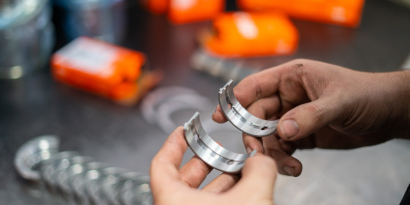Whoever owns a workshop is always thinking of ways to increase the number of customers and, consequently, their revenue. If there is a market that can be explored, it is agricultural machinery. However, you can’t just “open the doors” for this equipment from day to night. In fact, you need to be prepared to provide specialized service by deeply taking care of the mechanics of tractors.
Keep reading this article to find out what are the main skills you need to start providing services in this segment.
Everything you need to know about farm tractor mechanics
In order to help you better understand the particularities involved in the service of agricultural tractors, we have made a list with 5 items and their differentials in relation to other types of vehicles.
Check it out!
1 – Lubricating oils
First of all, it is important to know that there are different types of lubricant oil and that each one is suitable for a different part of these machines. And beware: confusing them can cause problems for the mechanics of agricultural tractors. That happens because the components of the oil vary in certain aspects, depending on their indication for use, such as thermal capacity and viscosity.
The lubricant for gears, for example, has different working temperature and durability than the one intended for the engine. There are also oils for the hydraulic system and engines in the running-in phase, ideal for agricultural tractors which, unlike light vehicles, do not have an adaptation period.
Therefore, it’s important to understand all the details and develop, alongside with the tractor owner, a schedule for checking and lubricating oil change. Including, it is interesting to show the owner of the vehicle how to check the oil outside the workshop, for preventive maintenance purposes. Thus, it is possible to increase the engine’s durability and performance, avoiding wear before its time.
2 – Tires
Tires are responsible for the quality of service and the safety of those who drive the vehicle. Therefore, ensuring a correct maintenance of this item is essential for the operation to proceed correctly and ensure a longer useful life for the equipment in general. In view of this, there are two aspects that the professional in charge of repairing needs to know: the calibration and the minimum height of the grips (grooves) of the traction tires.
Regarding the calibration, it should be done frequently, always following the recommended indications in the tractor’s manual. Keep in mind that over-inflation may cause the machine to skid on wetter terrain, while under-inflation increases tire wear. By calibrating correctly, greater adherence to the ground is guaranteed, preventing the tractor from skidding when it is performing tasks in the field, when the traction of the equipment is mandatory.
About the grips (grooves) of the tires, try to pay attention to the wear that they undergo over time. When they reach the minimum height, also according to the manual, the tires should be replaced. As a mechanic for agricultural tractors, the ideal scenario is that you keep track of this aspect with the customer and let him know whenever there is the need to make the lubricating oil change.
3 – Air Filter
You already know that in order to ensure optimal combustion in a car engine, the air that is mixed with the fuel must be clean. And it is the air filter installed in the intake systems that purifies the air that enters the combustion chamber. But there is more: the air filter also retains small solid particles suspended in the air, preventing them from causing premature damage and wear, resulting in loss of resources.
In order to ensure the best practices with this part, keep in mind that there are two different types of filters on the market: the oil bath and the dry air ones. How to know when to use each one? Well, that depends on the model of tractor. In oil bath filters, for example, the air from the engine’s intake first passes through a layer of oil and then through a filter element made of coconut straw — which does not need to be changed, just cleaned periodically.
On the other hand, dry air filters need to be changed from time to time. That happens because they are composed of a primary element, which retains the larger air particles, and a secondary element, which is located inside the cylindrical tube and is responsible for absorbing the smaller particles. Due to this construction, simply cleaning the part won’t be enough, so the replacement will be necessary. The mechanical professional must create a replacement schedule with the tractor owner, according to the time the equipment has been in use.
4 – Radiator
The radiator is responsible for controlling the engine’s temperature, an essential function to ensure proper operation and extend the tractor’s service life. Therefore, it is important to check the water level on a daily basis, as if it gets too low it can cause the part to overheat, damaging its operation.
Another important point here is to keep the item clean, because as the tractor works in the field, an environment with a lot of earth and dust, it is common for it to be covered with residues, which can obstruct air circulation and, consequently, also generate overheating. As this is a job to be done every single day, the mechanic’s role is to guide the tractor owner to clean and check the water correctly.
5 – Steering and Transmission System
Finally, one of the necessary knowledge about the mechanics of agricultural tractors concerns the steering and transmission systems — as well as the proper care involving them, obviously. In these systems, the most important items that need to be checked are oil leaks from hubs, axle sleeves and differential and gearbox boxes.
Advise your clients to always look for a professional to help solve this problem if they cannot do it on their own. It is extremely important to clean all the dirt caused by the leaks and block the points where they are occurring, as well as to complete the oil level whenever necessary.
Well, we hope this content can be useful for you to expand the range of services offered in your mechanical workshop. Keep following our blog, as it has lots of technical content, tips for your workshop routine and guides to simplify automotive repair. And if there’s something you’d like to see here, feel free to leave a comment in the space below!





